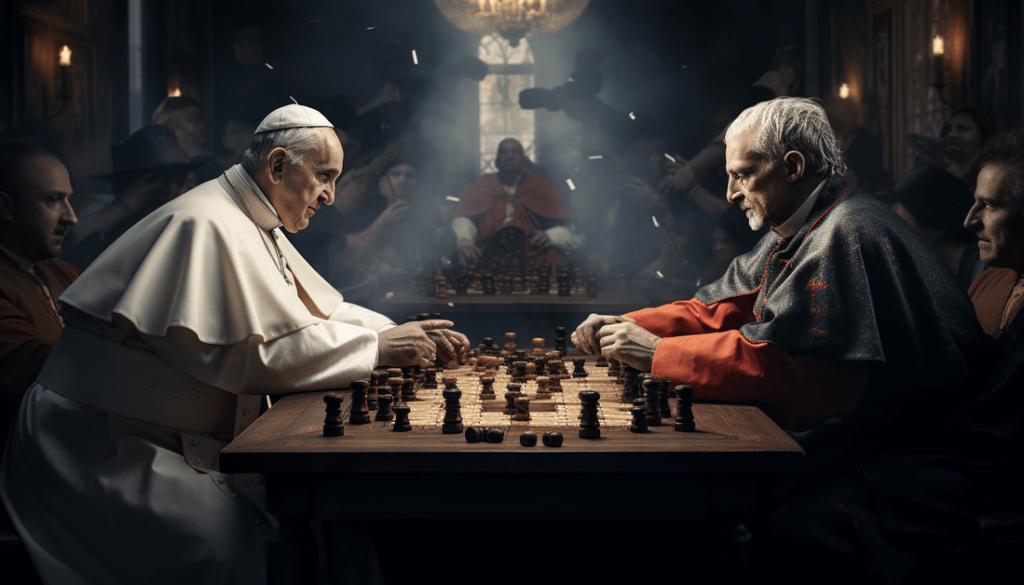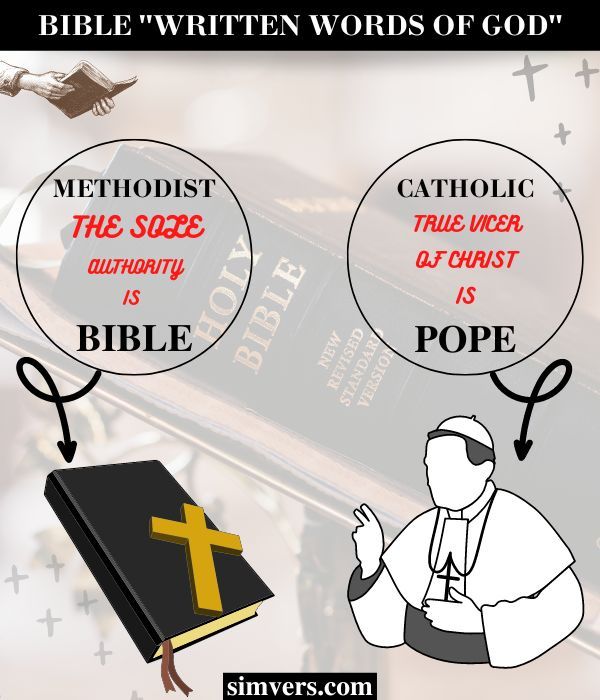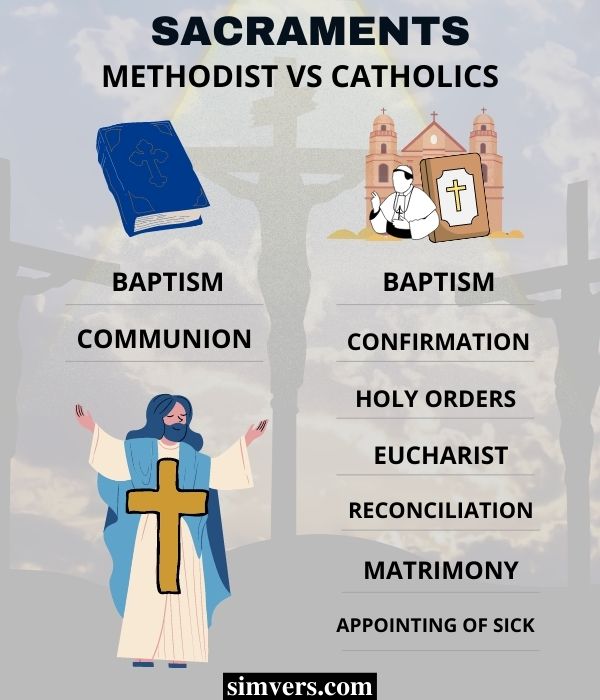
Both Methodist and Catholic traditions have mutual relationship, such as the Trinity (the Father, the Son, and the Holy Spirit), heaven and hell, Holy Bible. Both traditions follow the principles of the Bible and interpret them in their way. Besides common beliefs, they also have significant differences.
Methodists follow the instructions of John Wesley and consider the Bible, Christian’s final authority, while Catholics rely on the powers of their Pope and Bishop in addition to the Bible.
Overview of Christianity

Catholic, Protestant (Methodist), and Orthodox are the three primary groups of Christianity. Among them, protestants have various denominations, including Methodist. These groups and denominations have similarities and differences in their beliefs, traditions, and interpretations regarding Bible and churches.
Historical Difference
Knowledge of history plays a vital role in the differentiation between Methodism and Catholicism. The historical background of both traditions will make it easier for you to differentiate them.
| Historical Background | Methodists | Catholics |
| Introduction | John Wesley, an Anglican priest, founded Methodism with his brother Charles, and his friend George Whitefield. | In Dictionary, “Catholic” means “universal” or something like the globe. But in Christianity, “Roman Catholic” always refers to Catholicism’s historic branch and aspects. They follow the teachings of the western church. |
| As an Anglican priest | John Wesley never refused his Anglican belief but wanted a revival in his Anglican church. Thus, he formed Methodism. | In the first century, Catholicism was founded in the Roman Empire. |
| For Christianity | Methodism is a significant tradition of Protestant Christianity. It was founded in England. Most of its ideas are derived from the reformations that were led by · Martin Luther · Ulrich Zwingli · John Calvin | It is the oldest and most dominant group of Christianity. They believe Christ established the Catholic Church as His sole church. The Apostle Peter (Matt. 16;18-19) was the only bishop of Rome on earth. |
| Central Devotions | They are centrally devoted to salvation and consider it through grace and belief alone. Their theology is Arminianism. Their main emphasis is on growing and maturing as Christians on Wesley’s instructions. | They believe in the authority of the Pope, scripture, traditions, Bishops, Deacons, and Priests. Catholics believe that these all follow God’s teachings and play a supportive role between God and humans. |
Globally, the Methodist tradition is more common than the Methodist denomination because there are different denominations on earth, not a single. So, it is better to speak of Methodist as a tradition rather than a denomination.
Largest Methodists Denominations
According to population, there are four largest denominations. These are:
- The United Methodist Church (UMC)
- African Methodist Episcopal Church (AMEC)
- African Methodist Episcopal Zion Church (ECO)
- Christian Methodist Episcopal Church (CMEC)
Beliefs and Practices: Methodists Vs Catholics

The similarity between these two traditions is in their theology because both follow the teachings of God and practice them. Methodists believe that the Bible is the Christians’ sole authority. They consider themselves the purest form of Christianity by following the methods of leader “John Wesley”.
Catholics agree with the Bible and the power of the Pope and follow his teachings. They follow the western church. They believe the Bible shares equal authority with the church and its officials.
MORE:
- Cremation Biblical Perspective
- Crucifixion of Jesus
- Did Jesus Go to Hell
- Easter Festival
- Mahamrityunjaya Mantra
Differences/Disagreements (Methodist Vs Catholic)
| Differences | Methodism | Catholicism |
| Human Chief | Only Christ is the chief and head of the church. In Methodism, there is no concept of a human head like the Pope in Catholicism. | The Pope is the true representative of Christ on earth and the church’s leader. They follow his teachings. |
| Sacraments | Methodism has only two sacraments: Baptism Communion (Lord’s Supper) | Catholicism has seven sacraments: Baptism Confirmation Holy Orders Eucharist Reconciliation Appointing of the Sick Matrimony |
| Authority | Only Bible is authoritative on all matters of doctrine. Methodists follow the methods of “John Wesley.” | Three central authorities are the sacred Bible, tradition, and the teachings of the head of the Church (The Pope). |
| Pedobaptism | “Paedo” describes “child”. Methodists practice it. It means pouring. Baptism indicates involvement in the covenant community. | Catholicism also practices it. The aim of baptizing infants is to clean them of their original sins. And also regenerate them. |
| The Eucharist | Jesus is present only in a divine, spiritual and heavenly manner. | Jesus is additionally present using His Body, Soul, and blood. |
| Moral Issues | Methodists accept contraception and abortion and all related moral issues after many prayers. | The Catholics strictly reject moral issues such as contraception and abortion. |
| Saints | Methodists use the saints to describe all new believers. They honor the past believers but never pray to them. | The believers who died with great honor are considered for sainthood. Living believers respect the saint and also ask them for prayer. |
| Mother of Lord | “Mary”, the mother of Jesus. Methodists respect Mary due to her dedication to God. They used to learn from her life and never prayed to her. | Catholics consider Mary, their advocate. A pious lady, a perpetual virgin, who lived a great life and was called back to heaven. |
| Ordination | Pastors or ministers of Methodists can marry. Women can be appointed as clergy. | It describes the priests (men) and nuns (women) instituted by Christ and devoted themselves to religious life. |
| Church Understanding | An invisible church consisting of all true believers (dead or living) in Christ. | The Catholic church is the only pure church of Christ. |
Conclusion
Mutual respect is the beauty of the relationship between Methodist and Catholic traditions. The ministers of Methodist and Catholic members are both loving and kind to each other. But both groups take their beliefs firmly and seriously.
Practicing Methodists and Catholics defend their beliefs vigorously. Some Methodists considered Catholics as Christians who were living without any pure faith. Similarly, some Catholics thought Methodists were Christians without true faith except for true church.
All in all, Methodist and Catholic traditions both agree on God’s Nature and consider the Bible as God’s written words.
MORE:
- Jesus’ Birth
- Is Jesus God
- Non-denominational Churches
- Norse Gods and Goddesses
- Old Testament vs New Testament
